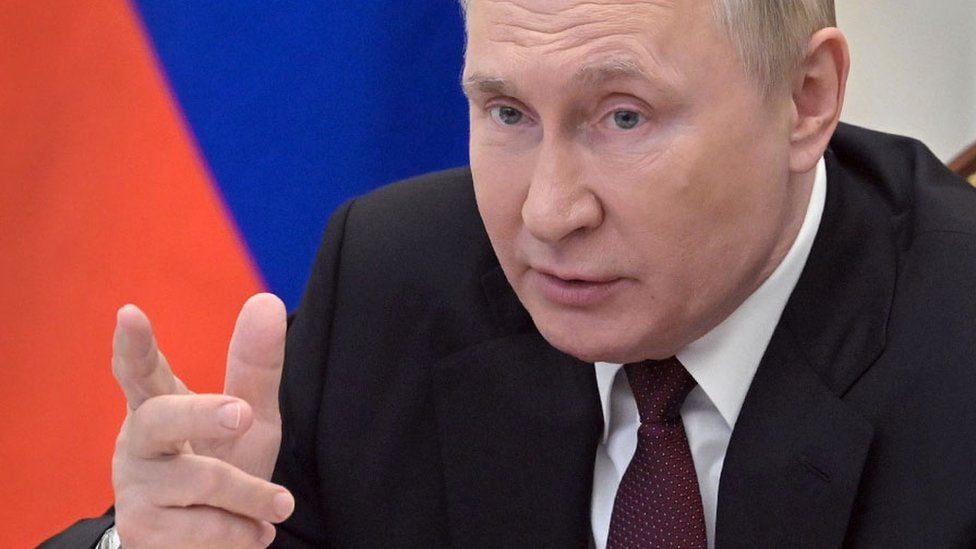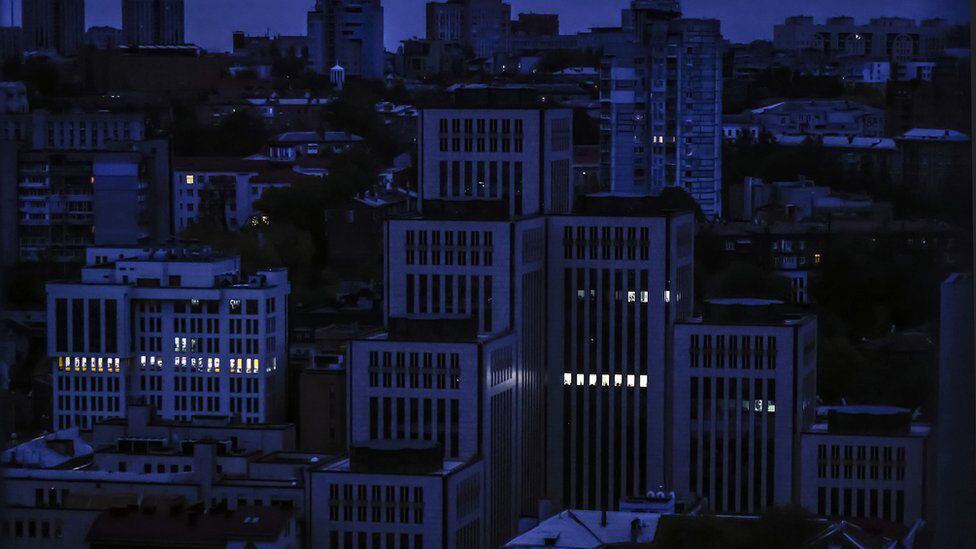:quality(75)/cloudfront-us-east-1.images.arcpublishing.com/elcomercio/GIZDANJNGEYS2MBRKQYDAORSGI.jpg)
It feels like I’m watching a scene from a James Bond movie.
Somewhere near Moscow, the president of Russia he is on a stage and they ask him about the apocalypse.
LOOK: What are kamikaze drones and how do they work (and what role are they playing in the war in Ukraine)
A moderator reminds Putin who once predicted that, after a nuclear attack, Russians would go to paradise.
“We’re not in a hurry to go there, are we?” asks the moderator hopefully.
Then there is a long, awkward pause. Seven seconds of silence.
“Your silence worries me,” says the moderator.
“It was the purpose,” Putin replies with a chuckle.
Sorry for not laughing. This is not a Hollywood blockbuster with a guaranteed happy ending.
The events of the last eight months are a real drama that have brought untold suffering to Ukraine and many believe that the world is closer than ever to a nuclear conflict since the Cuban Missile Crisis 60 years ago.
So how does the script go from here?
Much depends on the answer to this question: How far is Vladimir Putin willing to go to ensure victory or avoid defeat in Ukraine?
If you reread this speech to his nation from February 24, the one he made after ordering the invasion of Ukraine, you might conclude that he will do whatever it takes:
“And now some important – very important – words for those who may be tempted to meddle in what is going on. Those who try to get in our way or create threats to our country and our people should be vigilant: Russia’s response It will be immediate and it will bring the kind of consequences that they have never experienced in history.”
Outside of Russia, “consequences you have never experienced in history” was widely interpreted as unapologetic nuclear saber-rattling. And in the following months that noise continued.
In April, President Putin threatened “an ultra-rapid response if someone tried to interfere and create a strategic threat against Russia. We have all the weapons we need for this”.
In September he added his infamous line: “This is not a bluff.”
Last week, at the Valdai Debating Club (the scene where he starred in that long and worrying pause), President Putin was sending mixed signals. He denied any intention to use nuclear weapons in Ukraine..
“We see no need. There is no political or military need,” he said.

But backstage at the Debate Club there was no escaping the rumor.
“There is risk of Russia using nuclear weapons. Not against Ukraine, but against the West,” said Dmitry Suslov, a member of Russia’s Foreign Policy and Defense Council.
“If a single US missile hits a Russian military infrastructure inside Russia, we would make a historic leap towards a nuclear armageddon. According to official Russian nuclear doctrine, Russia would launch a strategic nuclear strike against the United States and all NATO allies as soon as we see Western missiles launched at our territory, no matter how armed they are. Then the whole planet will die“.
Alarmist rhetoric? Definitely.
Realistic scenario? I’m not so sure.
Leaving aside the presidential pauses (surely for drama) and recent Russian rhetoric, I think it is unlikely that the Kremlin is planning a nuclear escalation of the Ukraine war right now.
Especially considering these four reasons.
1. US mid-term elections.
With mid-term elections approaching in the United States, the Kremlin will know that the Republican Party has a chance to win control of Congress.

Earlier this month, House Minority Leader Kevin McCarthy warned that Republicans would not write a “blank check” for Ukraine if they regain a majority.
That is music to Putin’s ears.
Though it is unclear whether US aid to Ukraine would be significantly impacted by a Republican victorythe Kremlin will welcome any chance of a reduction in US military support for Kyiv.
2. Winter in Europe
It seems that Vladimir Putin continues to calculate that, with Russian gas supplies severely cut off to Europe, a cold winter will worsen Europe’s energy and cost-of-living crisis, forcing Western governments to make a deal with the Kremlin: reduce its support for Ukraine in exchange for Russian energy.

So far, Europe looks better prepared for winter than Moscow expected.
October was less cold than normal and the increases in supplies of liquefied natural gas imply that the reserves are full and the gas prices in Europe have decreased.
But if the temperatures decrease, the pressure may also increase. Especially in Ukraine, where the Russian military has been attacking its infrastructure.
3. Mobilization
In recent days we have seen Vladimir Putin taking steps towards mobilizing the entire Russian economy and industry for the needs of his “special military operation”.
In many ways it feels like the entire country has been on a long-term war footing. A sign, perhaps, that the Kremlin is now preparing for a protracted war in Ukraine.
4. Mutual Assured Destruction
This Cold War principle is still valid today. It is assumed that if one side fires nukes, the other side will respond accordingly and everyone will die. There are no winners in a nuclear war. Putin knows it.
All of this is based on the premise that it would be logical to assume that there will be no nuclear component to the Ukraine war.
But of course, there is a problem. Logic disappeared here on February 24, and wars do not necessarily follow a logical development.
If there is one thing the Cuban Missile Crisis taught the world, it is how the planet can suddenly be brought to the brink of destruction as a result of miscalculation and miscommunication.
Which brings me to the last reason…
5. Bugs

Putin’s “special operation” has not gone according to plan. What was supposed to take days or weeks at most already takes months. The Kremlin seems to have completely underestimated the Ukrainian resistance, the West’s support for Kyiv and the tsunami of international sanctions that Russia would face.
Despite assuring at the beginning that only “professional soldiers” would fight, President Putin has ended up declaring a “partial mobilization”. On top of that, Russian troops have been losing occupied territory in recent weeks due to the Ukrainian counteroffensive.
But Putin rarely admits to making mistakes. For now, he seems determined to continue this war and emerge with something he can call victory.
Source: Elcomercio
I, Ronald Payne, am a journalist and author who dedicated his life to telling the stories that need to be said. I have over 7 years of experience as a reporter and editor, covering everything from politics to business to crime.






